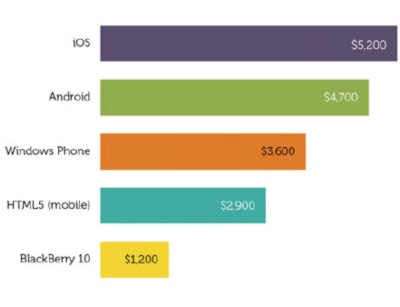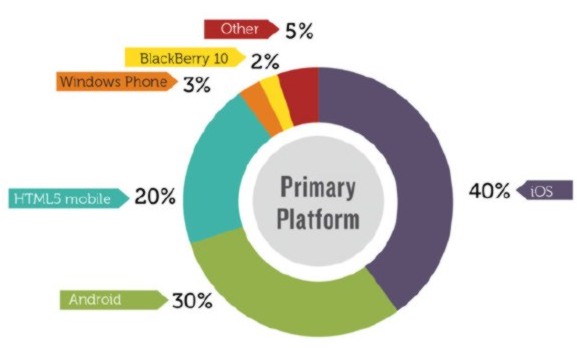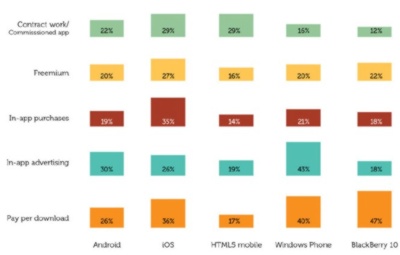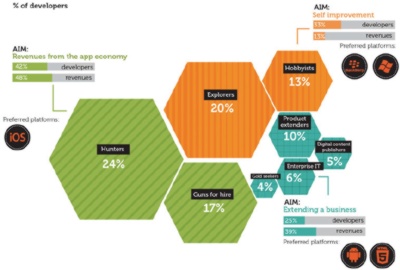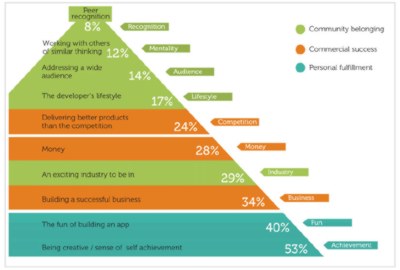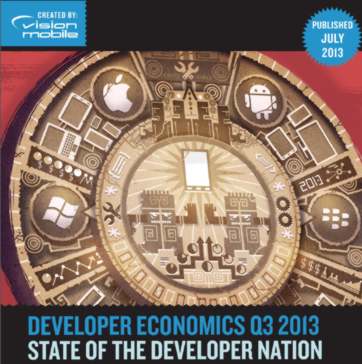| Revenue Generation For Mobile Platforms |
| Written by Janet Swift | |||
| Saturday, 10 August 2013 | |||
|
It is generally acknowledged that iOS leads the field when it comes to revenue generation from mobile apps. A recent survey from Vision Mobile provides a wealth of information to explain why this is the case and also finds that only 50% of mobile developers are concerned with making money. We've already discussed some results of the survey, conducted with over six thousand developers using a mobile platform as their primary development platform during April and May 2013, in Global Mobile Developer Patterns Revealed. Here we continue by looking at Vision Mobile's findings about revenue generation on different platforms.
Based on a sub-sample of over 2,000 developers, the average monthly revenue for iOS developers was found to be $5,200 followed by $4,700 for their Android counterparts. To a certain extent, however, this may simply be that iOS developers are concerned with making money from apps while Android developers.don't put as much priority on revenue generation. As mentioned in our previous item, one interesting finding from the survey is that when selecting a mobile platform, speed and cost of development came top for all platforms apart from iOS where revenue potential dominated. Another finding is that among over 1000 Contract developers, who are the group that are presumably those that need to make their living from the apps they develop, 40% choose iOS as their primary platform compared to 30% opting for Android and 20% for HTML5 mobile. The small percentages of contractors working with Windows Phone and Blackberry suggests that the finding that Windows Phone developers earn on average $3,600 and Blackberry 10 earn on average $1,200 need to be treated with caution given the small numbers involved.
Contracting is just one aspect in which preferred revenue model varies across platforms. Pay per download and In-app purchase are favored by iOS devs while In-app advertising comes top for Android, Windows Phone and Blackberry developers: This chart of the percentage of developers using various revenue models is based on a sample of 5,271 respondents: Click in chart to enlarge
The survey also presents interesting data about "developer personas" and the factors that motivate developers that suggests that not all mobile developers are concerned with making money. To quote the report: Building on our earlier Developer Economics 2012 research work, we extracted hard data on thousands of developers in terms of their aspirations, motivations, challenges and plans in app development. We produced a unique model of eight developer segments - the Hobbyists, the Explorers, the Hunters, the Guns for Hire, the Product Extenders, the Digital Content Publishers, the Gold Seekers and the enterprise IT developers.
Click in diagram to enlarge This diagram relates the eight developer segments to three goals:
It proceeds to presents the following hierarchy of developer motivations which reveals that at the base of the pyramid, the majority (53%) of mobile developers are motivated by creativity or the sense of achievement and that the fun of making an app, is a motivator for 40% of mobile developers, and this is not just restricted to those classified as Hobbyists and Explorers.
Click in diagram to enlarge
Money comes midway up the hierarchy being the primary motivator for just 28% of the sample of 4,644 mobile developers. The State of the Developer Nation report concludes: Revenues - in some form or other - are the goal for only 50% of mobile developers, which challenges the assumptions of developer marketing programs that use money as the main developer incentive.
More InformationState of the Developer Nation (pdf) Download from Developer Economics Related ArticlesGlobal Mobile Developer Patterns Revealed
To be informed about new articles on I Programmer, sign up for our weekly newsletter, subscribe to the RSS feed and follow us on Twitter, Facebook or Linkedin.
Comments
or email your comment to: comments@i-programmer.info |
|||
| Last Updated ( Wednesday, 12 February 2020 ) |
